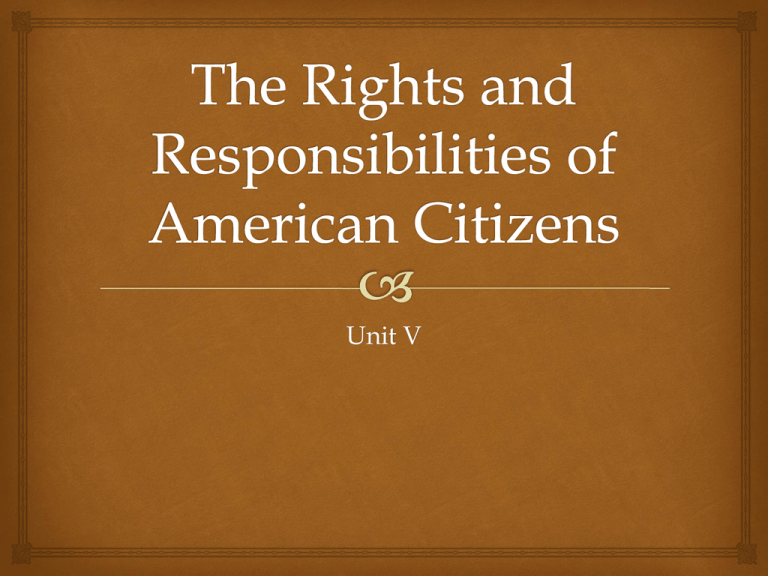The Rights and Responsibilities of American Citizens
advertisement

Unit V Bill Of Rights Anti-Federalists criticized the Constitution for the absence of a “Bill of Rights”. The first congress proposed ten amendments. These amendments were added to the constitution in 1791 as the Bill of Rights. First Amendment The First Amendment guarantees freedom of religion, free speech, freedom of the press, the right to assemble, and the right to petition the government. It also states that the Congress shall not establish any religion. Democracy These First Amendment rights are crucial to our democracy. They allow us to criticize government officials and debate issues without fear of government reprisals. Few of these rights, however, are absolute. Government can place reasonable limits on these freedoms. For example we cannot scream fire in a crowded theatre as a joke. Second & Third Amendments The Second Amendment guarantees our right to “bear arms” This allows citizens to own guns. The Third Amendment prohibits government from quartering troops in our homes without consent. These rights arose out of circumstances that developed during the American Revolutionary War. Fourth Amendment The Fourth Amendment prevents the police from conducting “unreasonable searches and seizures.” Unless a specific exception applies, the police need a search warrant before they can conduct a search. The Fifth Amendment The Fifth Amendment states that individuals cannot be tried twice for the same crime, or be forced to incriminate themselves. The Sixth Amendment The Sixth Amendment guarantees those accused of a crime a fair and public trial by jury and the assistance of a lawyer. The Eighth Amendment The Eighth Amendment prevents judges from setting bail that is too high, or inflicting “cruel and unusual” punishments. The Tenth Amendment The Tenth Amendment reserves powers not granted to the federal government to the state governments and the people. Fourteenth Amendment The Bill of Rights protected individuals from abuse by the federal government. The Fourteenth Amendment protects individuals from actions carried out by state governments. It grants citizens, “Due Process” and “Equal Protection” of the law. Naturalized Citizen Anyone born in the United States or with U. S. Citizens as parents is a citizen of the United States. A foreigner can become a “naturalized citizen.” To become naturalized, a person must be 18 years old, live in the United States for 5 years, be of good moral character, pass a test on U.S. History and Government, and take an Oath of Allegiance to the U.S. Constitution. Additional Rights and Responsibilities U.S. citizens have additional rights and responsibilities beyond those specified in the Bill of Rights. They are able to vote. They are able to serve on Juries. They are able to hold public office. They should try to remain informed on public issues and participate actively in public life. Homework Make a list of Questions for Interview Purposes like you are going to write a Newspaper Article. Interview your parents, relatives, and neighbors to find out what adults in your community know about the Bill of Rights and other Amendments to our Constitution of The United States. Write a Newspaper Article to Turn In by Monday



